Monkey Business in Borneo

Peregrina's Journey
Peter and Margie Benziger
Fri 21 Oct 2011 23:07
MONKEY
BUSINESS IN BORNEO
If you are ready for some monkey business, there’s no better
place than Borneo.
That’s because the wild orangutan, Asia’s only great ape,
can be found here. In fact, aside from
neighboring Sumatra, Borneo is the only place left in the world where you can
see orangutans in the wild.
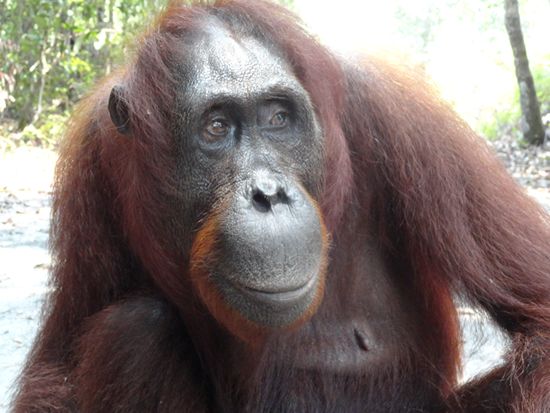
After crossing the Java Sea, Peregrina, traveled about 20 miles up a muddy river to the town of
Kumai, in the province of Kalimantan on the Indonesian side of Borneo. At this point, we had to leave Peregrina anchored at the side of the
river and board a small boat, called a Kelotok, which would be our home for the
next three days. Our destination was the Tanjung Puting National Park which
covers 4000 square kilometers and access is only by Kelotoks or small
speedboats.We chose a 2 night/3 day excursion aboard the Kelotok Wisata.
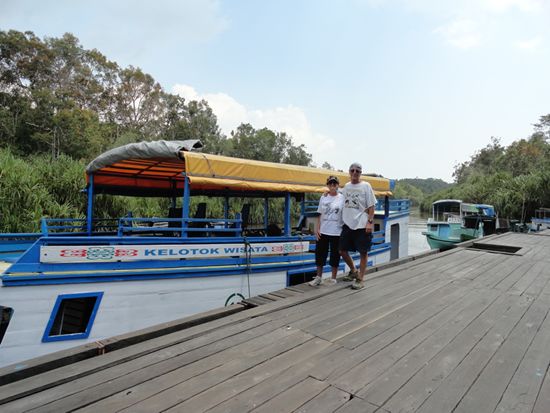
The food was great and the accommodations were… let’s say…rustic
but very comfortable.
Here is Margie “sleeping in.”
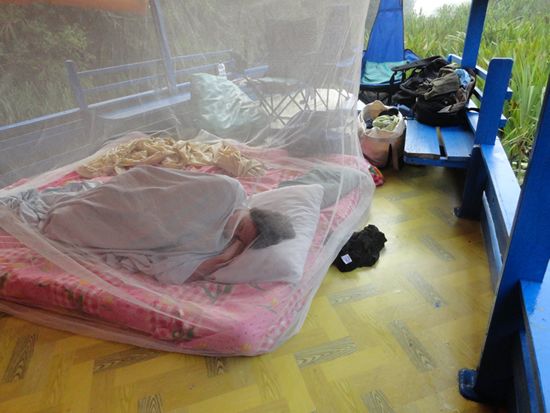
The trip up the Sungai (river) Sekonyer was wonderful. At times, the river got quite narrow with many
tributaries and we needed the guide on the bow of the boat to fend off the
overhanging branches and pick the correct channel.
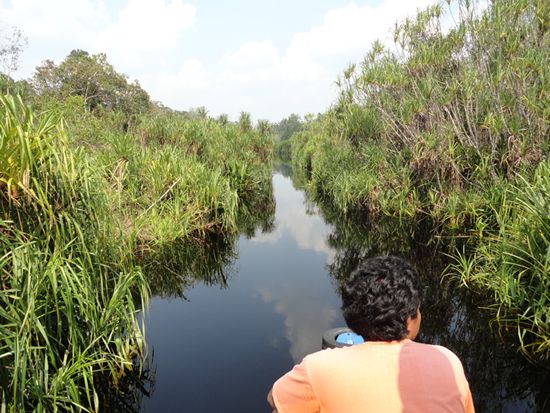
Every day, we would stop at a different jungle location and
hike inland to look for orangutans.
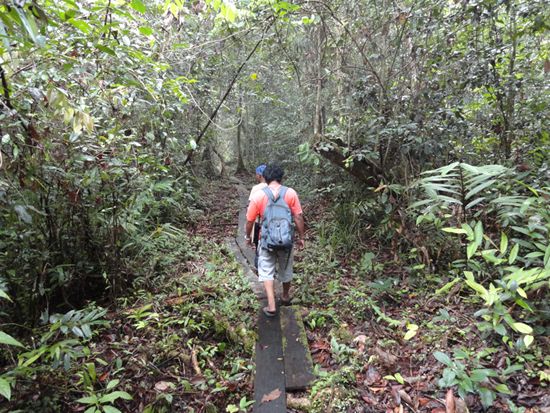
There were some pretty big trees. Our heads did not even
come up to the top of the root system.
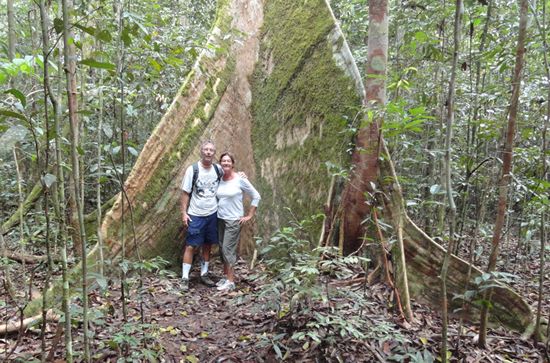
The wild orangutan is an endangered species and the
population has dropped dramatically over the past century.
One of the main reasons is that Indonesia has already lost
as much as 75% of its original natural forest habitat due to logging and
cultivation. Palm oil companies commonly use fire to clear plantations land. It’s commonly referred to as “slash and
burn.” One fire, in 1997/98, killed one
third of all Borneo’s orangutan population. More than 20,000 orangutans died.
In addition, the price on the Black Market for an orangutan is over $50,000.
The death of each orangutan is a problem because wild
females only give birth to one baby approximately every 8 years. Thus, each
baby is precious in the preservation of the orangutan population.
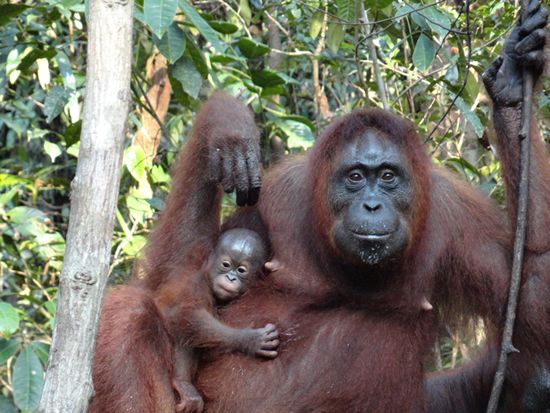
The center for the preservation effort at Tanjung Puting
National Park is known as Camp Leakey which was established in 1971 in honor of
Dr. Louis Leakey, the late paleo-anthropologist. The camp area includes 50
square kilometers of jungle and contains the orangutan rehabilitation center
for animals that have been sold as pets or orphaned. It is run by Canadian researcher, Dr. Birute
Galdikas with assistance from the Leakey Foundation. We visited the camp and several feeding
stations.
Staff members leave out bananas and a condensed milk drink
for the orangutans that have been released from the rehabilitation center. This is to supplement their diet as they get
accustomed to living on their own. It’s
not unusual to have more than a dozen orangutans gather at the feeding stations
and, quite often, another slew of wild orangutans watching the process from a
distance. It is a magical moment as
visitors watch the feeding station from a few meters away and the orangutans
begin swinging down through the trees to snack on some tasty treats.
Over time, the researchers have come to the conclusion that some
of these great apes will never be completely wild again. But, the Camp provides a sanctuary for the
primates and a world-class research center to study their behavior. Knowledge acquired here will help to
facilitate the survival of the species.
While the orangutans are incredibly human-like in their
behavior and, irresistibly cute, people are warned not to touch them since they
are susceptible to human diseases.
What’s more, they are super strong!
A female orangutan’s strength is approximately 4 times that of a human.
The strength of a male orangnutan is at least 8 times that of a man. Their grip is immensely powerful and they don’t
know their own strength. A few are very
inquisitive and will grab anything off your body – cameras, hats or bags.
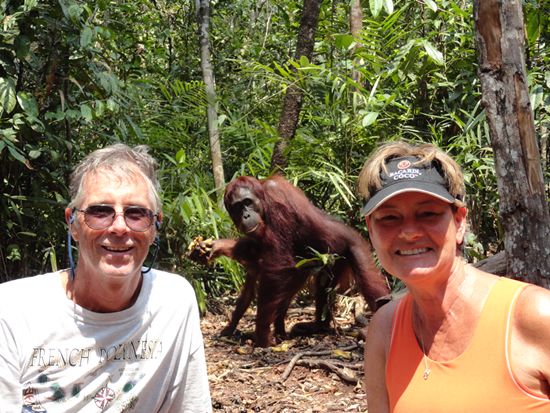
Orangutans are aboreal which means tree dwelling. The orangutan
is the largest arboreal animal in the world.
Walking through the forest, we
saw the orangutan’s swinging through the trees or simply hanging in seemingly
impossible positions.
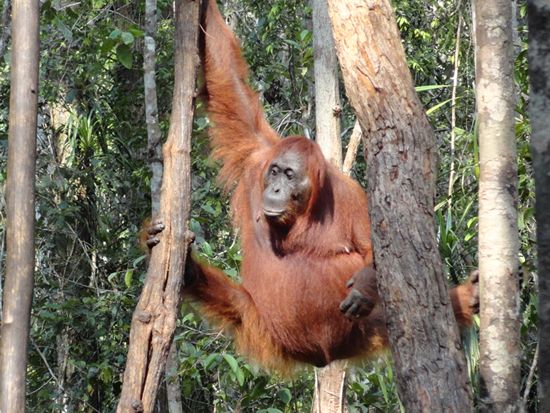
Generally, there is one dominant male and many females.
While we were in the forest observing a group of females feeding on bananas, we
heard a thundering crash of branches high above us. Overhead a huge (and I mean
HUGE ape) came hurtling through the foliage…breaking branches, tree tops and
anything that was in his way. He
descended like King Kong! When the dominant
male makes his entrance…EVERYBODY knows!
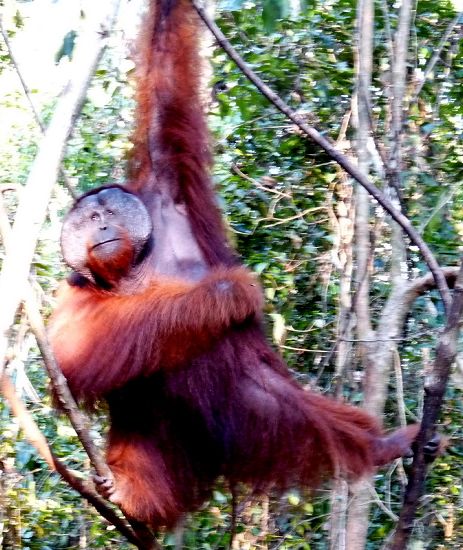
The male is 3 or 4 times the size of the female and his face
has hugely overgrown cheek pouches. It is said that some Star Wars movie
creatures were patterned after the Orangutan’s face.
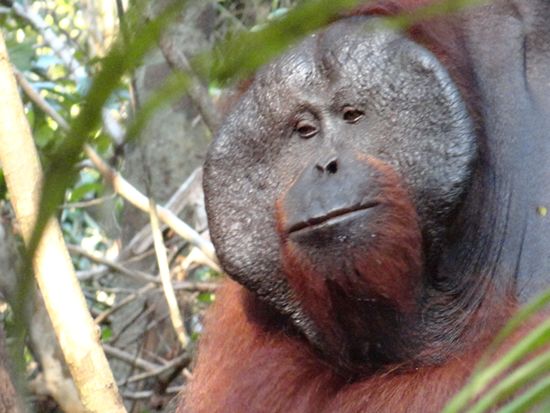
There is only one male for several females in each forest
grouping and, at the top of the pecking order is the dominant male, or The King. Each King has defeated or killed many other
males. This is Darwin’s theory of
evolution in practice… the biggest, strongest, fiercest male copulates with his
own private female entourage, thus ensuring that the offspring will be strong
and survive.
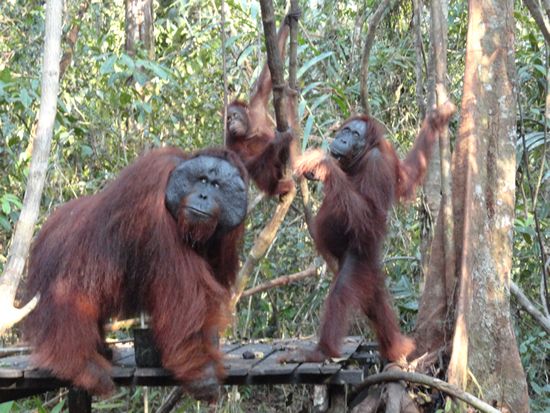
There is something very human about these beautiful
creatures. The name comes from the Malay/Indonesian words ‘orang’ meaning
person and ‘hutan’ meaning forest. Hence, the name Orangutan means person of
the forest.
Just look at that face!
Does it remind you of anyone you know?
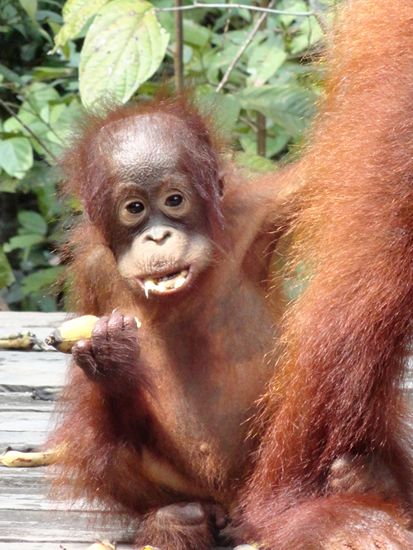
For more stories see our blog: http://blog.mailasail.com/peregrina
We will be back in Miami for Christmas and hope to see you.
Send us an email and let us know if you will be around.
Best to all our friends.
Peter and Margie